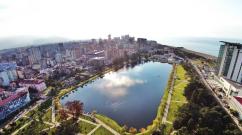How are apartments different from apartments in Russia and Europe? Which is better: apartment or apartment? What is the difference between an office and an apartment?
More and more apartments are appearing on the Moscow real estate market, but not all buyers fully understand what the features of such housing are. Specialists from the kvartirolog.ru service told The Village what apartments are, how they differ from apartments in principle, and what is more profitable to take out a mortgage if you have initial savings.
What are apartments?
Apartments are legally non-residential premises intended for temporary residence. They are usually located in redeveloped buildings in the city center or in new buildings where the developer was unable or unwilling to obtain permission for residential construction. Such buildings are usually registered as non-residential - hotel, office or other purposes. The type of building affects the amount of property taxes.
Modern apartments, as a rule, are not inferior to residential buildings in terms of landscaping and infrastructure of the house. But when purchasing them, you should pay attention to whether only apartments are located in this building and on your floor, or whether there will also be offices or even retail space. The most comfortable option is, of course, apartments in a building where apartments are also sold.
Legal status non-residential premises imposes a number of restrictions on the apartments:
You cannot register with them - you can only get temporary registration for five years with the possibility of extension. At the same time, you and your child will be able to use clinics, hospitals, schools and kindergartens in the area.
If one of your neighbors makes noise all night, you will have no legal basis to influence it.
Utility bills in apartments are 15–20% higher than in apartments - this difference arises due to different city tariffs for residential and non-residential premises. The same applies to property tax: it is 0.5% of the cost for hotel-type properties and other real estate properties, which include most apartments, and 2% for office premises. The tax on an apartment for individuals is equal to 0.1% of its value, if it does not exceed 10 million rubles. The rate for more expensive properties is higher and can reach 2%.
The developer is not obliged to comply with the standards intended for residential premises: insolation level, infrastructure development, etc. In fact, the standards are usually not violated much, especially if there are apartments in the same residential complex.
What does the apartment market look like in Moscow?
Up to 30% comes the price difference between apartments and apartments. One-room apartments are on average 15% cheaper than comparable apartments, two-room apartments are 20% cheaper. As you move away from the center, the price difference usually increases. True, some apartments are more expensive than comparable apartments.
About 50% residential complexes with apartments belong to the business class, slightly less than 40% - to the elite class, 10% - to the comfort class.
2.3 million rubles the cheapest apartments within the Moscow Ring Road are priced (room with an area of 16 sq. m. in Marfin with delivery at the end of 2018). For 2.4 million rubles you can buy an apartment of 25 square meters. m. in Vostochny Biryulyovo, which is promised to be completed at the end of this year.
How different are the prices for apartments and apartments?
Moscow region
Minimum price of an apartment, million rubles.
Minimum price of apartments, million rubles.
from Sadovoy to the Third Transport Ring
5.2 (36 m²)
3.2 (17 m²)
near the Third Transport Ring
4.1 (22 m²)
4.4 (27 m²)
from the Third Transport Ring to the Moscow Ring Road
2.4 (25 m²)
2.3 (16 m²)
What is more profitable to take out a mortgage?
Let's say you want to buy real estate near the Third Transport Ring, no further than two or three stations from the Circle Line within a 15-minute walk from the metro. You are considering business class residential complexes with delivery in 2018 and choose a one-room apartment or apartments with an area of about 40 square meters. m. On average, such an apartment will cost 9.1 million rubles, and apartments - 7.8 million rubles.
Let's say you have 3 million rubles as a down payment, the rest of the amount can be taken out on a mortgage at 11.7% per annum (average mortgage rate in Moscow for the 1st quarter of 2017 according to the Central Bank of the Russian Federation) for 15 years. The cost of compulsory property insurance will be 0.15% (accrued annually on the outstanding balance) per year. At the same time, it is desirable that your income be at least 150 thousand rubles if you are buying an apartment, and 180 thousand rubles if you are buying an apartment: it is recommended that the monthly mortgage payment be no more than 40% of your earnings.
How much will a mortgage cost?
Expenses
Apartment, million rubles
Apartments, million rubles
Object cost
Down payment
Loan amount
Total payments for the entire loan term
Thus, with the initial difference in price between an apartment and an apartment of 1.3 million rubles, the final difference with a mortgage is 2.8 million rubles.
Several years ago, such special objects as apartments appeared on the real estate market. Everyone is accustomed to associating with this concept some kind of elite housing with panoramic glazing or luxury rooms in foreign hotels. In part, this was once the case, but today everything has changed dramatically, and it is not so easy to understand what the difference is between an ordinary apartment and an apartment in 2019.
What are apartments and what type of real estate are they?
In order to understand the question posed, you must first find out what apartments are and how they differ from an apartment. Turning to various sources, you can find out that this term has French or Italian roots, and is translated into Russian simply as “apartment”. Ushakov's dictionary defines an apartment as a large room or rest. However, this does not explain in any way what the legal difference is between apartments and apartments.
If you turn to Russian housing legislation, you can easily find out that residential premises mean:
- residential building or part thereof;
- apartment or part thereof;
- room.
This list is exhaustive and there are no apartments on it. Therefore, according to the law, this type of real estate cannot be classified as residential. However, such premises are used specifically for living and are equipped with all necessary amenities. To come closer to understanding the difference between apartments and apartments, you need to understand in which buildings these objects are located and what their functional purpose is.
If we take foreign experience, we can see that abroad property for temporary residence with hotel services is classified as apartments. This is partially true for Russia as well. For example, the order of the Ministry of Culture, which classifies objects of the tourism industry, contains the concept of apartments, which differs markedly from the definition of a hotel room. These include premises with an area of at least 40 square meters, consisting of two or more rooms, equipped with furniture, bathrooms and everything necessary for temporary residence.
Sometimes such residential blocks are located in office buildings or in large business centers. They are intended for accommodation of employees sent from other cities to perform certain temporary functions. Apartments are also available for staff who do not have their own housing.
Today at major cities You can find new buildings consisting entirely of apartments, which differ from apartments in that they have greater commercial value. Wealthy people invest in the construction or purchase of such real estate for subsequent profit.
Thus, the answer to the question of what does it mean to have an apartment rather than an apartment can be formulated as follows. A room intended for temporary residence with a separate entrance, included in an apartment-type hotel complex or located in an administrative building, is usually called apartments. Unlike an apartment, it does not belong to the housing stock.
Pros and cons of apartments
Let's look at the difference between apartments and apartments in practical terms: the pros and cons of purchasing such real estate. As was established earlier, apartments do not belong to the housing stock. It is from this circumstance that the existing shortcomings of these objects arise:
- It is impossible to register with them permanently at your place of residence. True, there are no obstacles to temporary registration at the place of stay if the premises have hotel services. As in any hotel room, you can temporarily register in the apartment for up to 5 years. The absence of at least temporary registration can create problems with enrolling children in school or kindergarten, obtaining a compulsory medical insurance policy for services in medical institutions;
- To commercial real estate Housing and communal services tariffs that are used for residential premises are not applicable. In this regard, you have to pay much more for utilities than in the case of an apartment of the same area. The difference can reach up to 20% in some cities;
- tax legislation is not very friendly towards commercial real estate. Thus, the property tax rate for apartments is 0.5%, in contrast to an apartment, for which only 0.1% of the base is charged, which for commercial real estate, however, is 1.44 times less. Calculation of deductions upon sale is carried out according to the rules for non-residential premises. In this case, a deduction for the purchase is provided, as for an apartment - in the amount of 2 million rubles;
- what else are the apartments in? worse than an apartment The problem is that developers are not obliged to organize social and cultural infrastructure in the places where such objects are being built. For this reason, kindergartens, schools and clinics may be located at a considerable distance from the complexes, and access roads may be completely absent;
- the law does not extend the SANPIN standards provided for residential premises to apartments, which gives developers a free hand. After all, they do not need to comply with the level of illumination, noise insulation and other mandatory parameters;
- In the case of shared-equity construction of apartments, the status of shareholders is radically different from that if the house had apartments. They are simply not recognized as victims according to the parameters of the Ministry of Regional Development in the event of bankruptcy of the developer.
The list of disadvantages is quite impressive, but what is the advantage of apartments over an apartment, that the demand for them is growing every year. Everything is simple here, because the absence of the need to comply with many formalities during construction greatly reduces the cost of such real estate. At the same time, the end buyer needs to pay a much smaller amount for the apartment upon purchase, which compares favorably with purchasing an apartment. This makes it possible not only to purchase relatively cheap housing, but also to make good money by renting it out.
Watch useful video
Should you buy an apartment instead of an apartment?
Many people wonder what is better: an apartment or an apartment? However, this question is not entirely correct. This is about the same as comparing a therapist and a dentist. It seems like both are doctors, but their tasks are completely different. In practice, it is better to buy an apartment for those who have no other permanent housing. After all, the presence of residential premises guarantees permanent registration and, as a result, free access to the various social needs of the family.
If you already have permanent registration, then the question of whether to choose an apartment or an apartment is no longer so clear-cut. In this case, commercial real estate can be purchased for the following purposes:
- for own residence due to proximity to the place of work or study, or due to more comfortable conditions. At the same time, it is quite possible to rent out a permanent apartment;
- for renting out for commercial profit;
- for organizing hotel business.
It is the commercial component that determines the main reason why apartments are built rather than apartments, especially in Moscow.
Answers to some questions
Taking into account all of the above, we can answer the question, is a studio an apartment or an apartment? It all depends on the legal status, not on the layout. After all, a studio is a living space that does not have partitions, that is, an open layout. It can apply to both residential and commercial real estate. In the first case it is an apartment, and in the second it is an apartment.
Another pressing question is whether it is possible to transfer apartments to apartments in 2019, and what is the price of this procedure. The possibility of converting non-residential premises into residential premises is enshrined in housing legislation. It should be borne in mind that the procedure is quite complicated. The main obstacle is to ensure full compliance with sanitary standards, for example, sunlight must enter each living room of the premises for at least 2 hours a day. Therefore, apartments that are characterized by insufficient insolation cannot be transferred to the status of apartments. In addition, no encumbrances by third parties should be imposed on the property.
If all the rules can be met, you can try to make a transfer. To do this, you will need to contact the housing department of your city with an application.. The following documents will have to be attached to it:
- registration certificate for real estate;
- title documents;
- floor plan of the building;
- redevelopment project, if it is planned to be carried out.
In addition, it is necessary to undergo approvals from various services and government agencies, and then submit the relevant certificates. All this may take more than one month, and the money spent will negate the benefits of buying an apartment instead of an apartment. In addition, the success of the event is not guaranteed. Therefore, individual transfer is not economically justified. True, there were cases when owners en masse turned to the developer with a corresponding collective request to transfer apartments to the status of residential premises even at the construction stage before putting the house into operation. At the same time, their issue was resolved positively.
Thus, apartments differ from apartments in the absence of the status of residential premises. They cost less, but it is better to purchase them if you have permanent registration in another place. After all, converting non-residential premises into residential ones is quite difficult, and often completely impossible. At the same time, buying an apartment is a very profitable investment in real estate, since the demand for rental housing is always very high.
Today apartments can be found not only in the luxury segment - more and more offers are appearing on the market. The apartments are in demand and have become available to a wide range of buyers. However, the acquisition of such real estate is fraught with a lot of peculiarities.
The first question that arises for the average person is what are apartments? Many people do not know that they are distinguished from apartments by a number of important details. And if previously large studio apartments were considered apartments, now this type of housing is acquiring more precise legal features, and apartments can be found even at 30 square meters. meters. Essentially, this is the same hotel where you can buy a room with a kitchen, and the price of which includes hotel infrastructure. There may already be places for recreation, fitness rooms, restaurants and spas, as well as office space and conference rooms, note specialists from the Azbuka Zhilya company. Apartments are non-residential premises; theoretically, they are commercial real estate. That is why many apartment complexes are converted office buildings. In Moscow, in areas where the development of residential properties is prohibited, it is quite legal to build apartments and sell them as residential premises. It will not be possible to register in such a place, but you can do temporary registration, and even then not everywhere and not always. That is, the main difference between apartments and apartments in Russia is their different legal status.
Tretyakova DariaHead of Consulting and Analytics Department at Azbuka Zhilya“For a family with children, for example, the inability to register in an apartment is a significant disadvantage for life. Accordingly, difficulties will arise with the use of district clinics, kindergartens and schools. It is quite difficult to get a mortgage loan to buy an apartment. And programs aimed at supporting the purchase of housing do not apply to apartments. Unlike an apartment, an apartment can be seized by a creditor from the owner, even if it is his only home.”
However, apartment owners are of little interest in registration, Hospitality Income analysts note. As a rule, such properties are purchased as a second or third home for wealthy people. Usually, expensive apartments are purchased by employees of foreign companies, top managers, and businessmen - location and hotel service are important to them, notes Daria Tretyakova, head of the consulting and analytics department at Azbuka Zhilya. In addition, the status of non-residential premises allows apartment owners to register legal entities, which can be convenient for the company.
Elena Lysenkova CEO of Hospitality Income“This format of residential real estate, veiled as a hotel format, which came to us from the West, is being implemented in many Russian cities and in general it has become familiar. And the fact that registration in them is impossible does not bother anyone. If we talk about the development of the apartment market in general, then the direction of apartment real estate is currently developing in two formats. In the apart-hotel format, when the hotel complex was originally created to rent out rooms for temporary accommodation of guests, but these rooms have more spacious characteristics compared to classic hotel rooms. And service apartments, which are a complex of apartments that are first sold to the market to end users, who, in turn, can transfer these apartments to the management of a professional centralized management company that will rent out and maintain the apartments.”
The disadvantages include operating costs and increased taxes. Today it is five times more for apartments than for an apartment, and monthly service fees can vary from 15 to 40 thousand per month or more. But the apartments are much cheaper - 15-20% lower than apartments of the same level. This is largely due to the lack of infrastructure - the developer is not obliged to build clinics, kindergartens and schools, as is done in the case of apartments. For example, the center of Moscow is experiencing tension - schools and kindergartens are overcrowded, and the number of apartment complexes is growing. In addition, such facilities may lack parking spaces, which also increases the load on city infrastructure.
Despite minor shortcomings, the apartments have a number of important advantages. And here, as they say, it’s a matter of taste and priorities: your choice should be based on the purpose for which you are purchasing housing. According to Hospitality Income Consulting specialists, the demand for apartments will only grow in the next three years.
When we hear the word “apartment”, we imagine luxurious housing in a stylish area. But the legal status of such premises does not classify it as residential. Therefore, they choose an apartment for permanent residence.
What are apartments?
Housing legislation does not provide a direct concept of apartments and it is not in the list of objects that are called residential. That is why they are classified as premises not intended for permanent residence, along with hotels. In addition, it is allowed to locate apartments in shopping and business centers, where in addition to them there are retail areas and office premises.
Such premises are mentioned in documents establishing standards in the field of construction and tourism. Requirements for the apartment say that this is a room for accommodating people:
- with an area of at least 40 sq.m.;
- number of rooms at least two;
- the presence of a kitchen corner.
It should be noted that such urban real estate has become a godsend for megacities. It is apartments that are popular among organizations and corporations, which can buy enough at once at a low price. large number space near your office and temporarily accommodate workers there who will not spend a lot of time commuting to work.
Types of apartments
By type, apartments can be divided into two large groups:
1. Budget. Such premises are usually built according to designs similar to apartment buildings, but due to existing circumstances they cannot be residential buildings.
These may be cases when:
- the building was erected on a plot of land not intended for residential construction;
- The applied design solutions are not permitted for housing construction.
As a result, such construction is quite cheap for the developer, and therefore apartments in such a building will be more tempting in price for the consumer than apartments.
2. Luxury. This is the level of premises that are located in business and office centers. They are distinguished by the use of technological innovations and architectural solutions. But, since the original building has land under it only for non-residential development, the premises in it can only have the status of apartments. Of course, the cost of luxury rooms is much higher than budget rooms and even apartments, but the area, as a rule, is much larger, and the finishing materials and technologies used are highly expensive.
Therefore, such apartments, as a rule, are not the only housing for the person who bought it, or a source of additional income when renting out.
What are the differences from an apartment when buying?
- The main difference is the fact that an apartment is classified as a residential property, while apartments are not. It is important to pay attention to this when purchasing, since you can get permanent registration in the apartment with all the ensuing positive aspects.
- The apartments are suitable for permanent residence, only for temporary accommodation. It is impossible to register there. For those who do not have a fundamental question of registration because it is located in another living space, they can live in an apartment for decades. Moreover, the asking price is lower than for an apartment.
- Additionally, it should be noted that it is impossible to buy this type of real estate such as apartments using a mortgage loan. Banks don't give cash on bail, since they are not subject to Federal Law No. 102 “On Mortgage”.
- The apartment not only has the status of residential premises, but also necessarily complies with all fire, sanitary and construction standards, and is therefore suitable for permanent residence. Commercial construction is carried out according to other standards, which are not so demanding on ventilation, sound and heat insulation, etc. The apartments belong to a commercial project, therefore they contain shortcomings that are discovered during the stay.
- The developer is obliged to provide residential areas with infrastructure with the arrangement of the local area, the installation of a children's playground, parking spaces, as well as street lighting. These requirements do not apply to non-residential properties, including apartments.
From this we can conclude that an apartment is much more profitable when buying in a legal sense, but more expensive than apartments.
Pros and cons of apartments as a type of housing
It remains to sum up and summarize the advantages and disadvantages of this type of housing such as apartments. The most obvious advantage is the price of the property. Apartments of similar sizes in the same area will cost the buyer about 15-20% more.
In addition to this, a number of positive points can be identified:
- apartments can be located in large shopping and office centers, which are usually located in the central areas of the city;
- the ability to carry out redevelopment at your own discretion without obtaining approval documents, which allows you to apply any design solutions to realize the most daring ideas. The only limitation may be self-study planning for the presence of load-bearing walls, so as not to violate the integrity of the structure;
- Since the apartments are close to hotel premises, there may be services in the form of administration, a large lobby, cleaning, security, etc. Additionally, on the territory of the apartment complex, especially in shopping centers, there may be beauty salons, fitness rooms, spas and other comfort facilities;
- in big cities, this is an investment project that will bring profit from renting out space.
But when selling apartments, many are told in vivid colors only their advantages, trying to leave them “behind the scenes” negative aspects, and there are actually quite a few of them:
- the most significant disadvantage is the inability to obtain permanent registration, only temporary, which is given for a five-year period with the right of extension;
- when purchasing such premises during shared construction even at the construction stage, the buyer will lose payments from the compensation fund in the event of bankruptcy of the developer;
- when constructing apartments, the standards that apply to commercial development are applied; they differ significantly from residential ones;
- The purchase of apartments is possible only with your own funds without the possibility of attracting mortgage loans. The effect of state social projects (maternity capital, housing subsidies) also does not apply to them;
- tax rates for property tax are higher (0.5 or 2) than for apartments (0.1). In addition, the Tax Code regarding the application of tax deductions and personal income tax refunds is not applicable to apartments;
- increased tariffs for utility bills, which apply as to a commercial property; additional fees may be charged for services, for example, concierge, security, etc.;
- inability to organize a homeowners association to manage the property of the house;
- it is groundless to demand compliance with the rules of cohabitation. Since the premises have non-residential status, you do not have the right by law to prohibit your neighbors from organizing a recording studio or gambling club on your territory.
In order to solve a number of problems associated with the purchase and living in apartments, it is necessary at the legislative level to equate them to residential premises.
The residential and commercial real estate market is incredibly vast. When offering housing properties, realtors often call an apartment an apartment. This term becomes a kind of symbol of success, luxury, independence and wealth.
But are these concepts the same - apartment and apartment? Even the most superficial glance will determine that these are completely different things. Let's look at the difference between apartments and apartments. Let us determine how significant these differences are and why these concepts should be clearly distinguished.
What is an apartment?
The following definition is generally accepted. An apartment is a type of separate real estate used both for permanent residence and for rental. It has a separate entrance and is fully adapted for normal life: there are all necessary communications, heating, water supply, sewerage. Apartments are not the same, they differ from each other in their different location in the city, area, type of structure of a residential building, its number of floors and many other parameters. But, despite all the differences, apartments make up one specific segment - residential real estate, or housing stock.

There are enough offers for the sale of apartments on the domestic real estate market: this includes secondary housing. Apartments for sale may be excellently renovated, but are usually not furnished.
Apartments: what is it?
Apartments equipped modern communications, excellently furnished and located in hotel complexes, are called apartments. This is luxury real estate increased comfort, used for temporary residence of wealthy guests. The main characteristics of such a facility are modern stylish design and full provision of household and technical communications. Accommodation in apartments is possible only on a temporary basis.
In other words, apartments are non-permanent housing, identical to a hotel room. And just like in a classic hotel room, an indispensable attribute of staying in it is full service at a time convenient for guests, including the full range of cleaning work, changing linen, providing parking spaces, specialized security services, and other infrastructure facilities.
This one is very popular in resort areas and metropolitan areas. Wealthy citizens often buy apartments in close proximity to work to save time. Comfortable complexes, so-called apart-hotels, are being built fairly close to the sea or the business center of the city.

The potential buyer is offered various types of apartments, the most common of which are one-bedroom and Western “studio” options, in which the living room is combined with a kitchen. However, the market sells apartments with 2 and 3 bedrooms, as well as multi-level premises. The difference between an apartment and an apartment is that the buyer of an apartment acquires a living space with modern renovation, stylish furniture and built-in appliances.
Legal status of the apartments
In Russian legislation, the concept of “apartment” is not fixed, at the same time, the term “residential premises” is given a fairly broad definition. They confess separate room as part of real estate, suitable for permanent residence and complying with established standards of sanitary, technical and other operational rules. The legislation provides for the following types of premises as residential premises: a house or part thereof, an apartment or a share in it, a room. The term “apartment” does not refer to the “residential real estate” segment. In other words, to the question about apartments: what is it, you can answer that it is residential premises in a non-residential building.
Differences between an apartment and an apartment
So, apartments are not related to the housing stock, so they can be created in buildings of any type, for example, office buildings. To be assigned the “apartment” status, belonging to the housing stock is required. In addition, there are differences between these concepts in other planes:
- according to the requirements of the State Standard, the area of the apartment should not be less than 40 m2, and the number of rooms should be 2 or more; the presence of a bathroom and a kitchen is considered mandatory;
- Such requirements are not imposed on an apartment, which may have only one room with a much smaller area.
Let's take a closer look at each difference between an apartment and an apartment.

Price
Real estate market experts note that the price of apartments is usually 10-15% lower than the cost of an apartment of a similar type, but operating costs are always higher. This is due to the fact that the cost utilities for apartment owners is significantly higher than their cost for residential property owners. In particular, heating services are higher by 20-30%, water supply and sanitation - by 12-25%. The presented figures are ambiguous; prices for housing and communal services depend not only on the regional location, but also on the nature of the connection of utilities with the networks of resource supply organizations. For example, if services are provided through intermediaries, then you will have to pay even more for them.
The absence of the concept of “apartments” as part of residential real estate does not allow their owners to apply for subsidies for utility bills, provided that their total monthly income for the last 6 months does not exceed established standards. Apartment owners cannot take advantage of the benefits regulated by the Housing Code. What is the difference between an apartment and an apartment, besides cost characteristics?
Registration Features
Purchasing an apartment presupposes the possibility of permanent registration at the residential address. It is impossible to register in apartments at your place of residence due to the fact that legally they are not housing.

The question of the possibility of temporary registration in apartments still remains unclear, although there is no direct prohibition on the exercise of such a right by owners of apartments purchased in buildings with the status of an apart-hotel or hotel.
Lack of objects of social significance
When deciding which purchase is more profitable - an apartment or an apartment, you should remember that the developer of such buildings does not bear any obligation to construct social infrastructure facilities. Actually, this factor explains the relative cheapness of apartments - developer hotel complexes, as a rule, does not build schools, kindergartens and clinics.
Despite the fact that realtors usually do not raise this problem or smooth it over with assurances that apart-hotel developments are carried out in areas with established infrastructure, one should not forget about it. In megacities, the volume of construction and sale of such complexes is very significant, and social facilities not in every district can provide an increase in unregistered users.
The management of Moscow's urban planning department plans to approve construction standards obliging developers to build infrastructure facilities in parallel with the construction of hotel complexes. Most likely, the introduction of such obligations will raise the cost of apartments to the price of apartments.
Permission to redevelop apartments is not required
How are apartments different from apartments? The fact that the need or possibility of redevelopment of these premises is regulated by the general provisions of the Town Planning Code, according to which permission is not required if the proposed changes do not bring about structural changes and do not change the level of reliability and safety of a non-residential building. And if the lack of permits greatly simplifies the reconstruction of apartment premises, then there are many problems in the organizational features of the functioning of such buildings.
Difficulties in managing non-residential buildings and differences in property taxes
According to the Housing Code, the technical premises of an apartment building (attics, basements, etc.) are in shared ownership of the owners of residential premises. This rule is not provided for apartments. Therefore, the buyer purchasing them must remember that the ownership of the rest of the building and utility networks is with the developer, and he can impose on the owners the services of a management company that is beneficial to him.

In addition, the legislation adopted since 2015 has significantly increased the property tax, the calculation of which will now be carried out on the basis of And if the housing tax rate is 0.1% and quite impressive benefits are applied, then non-residential real estate, which includes apartments, is taxed at a significantly higher rate.
Nature of acquisition
The difference between apartments and apartments also manifests itself for purchasing purposes. The purchase of apartments, as a rule, is of an investment nature, i.e. in most cases they are bought for profit, while the purchase of an apartment has a pronounced social background - accommodation.

If the owner of an apartment registers as an individual entrepreneur and declares income from renting out property, then he does not have the right to tax exemption when selling these premises, even if they have been owned for more than 3 years.
Understanding the differences, it is easier for a potential buyer to decide which room suits him best - an apartment or an apartment. What is best for him and the goals he pursues, only he knows. The status of the purchased property depends on the nature of the acquisition, opportunities, necessity or other conditions. Now, when considering a future purchase, you can clearly imagine how an apartment differs from an apartment.













